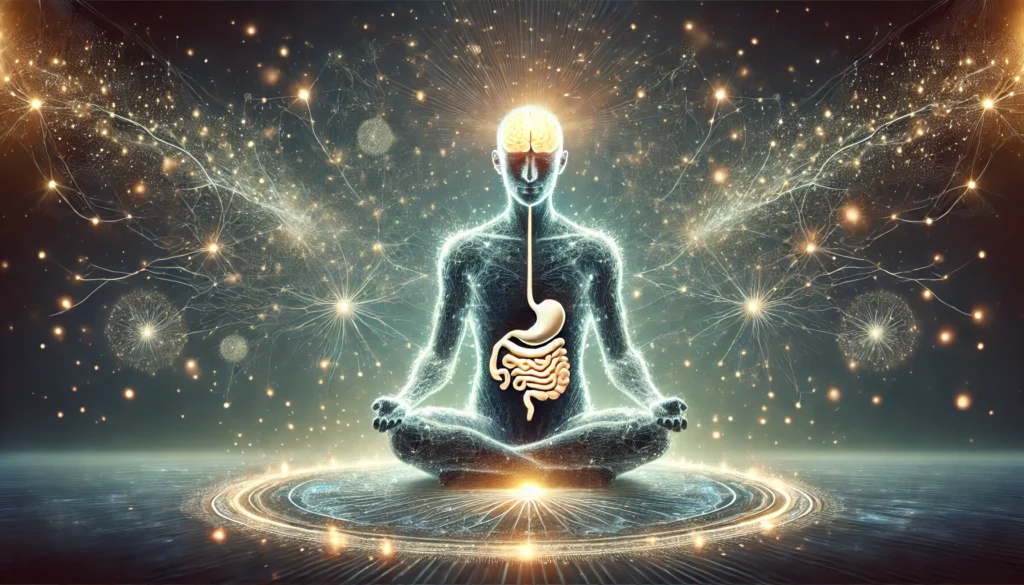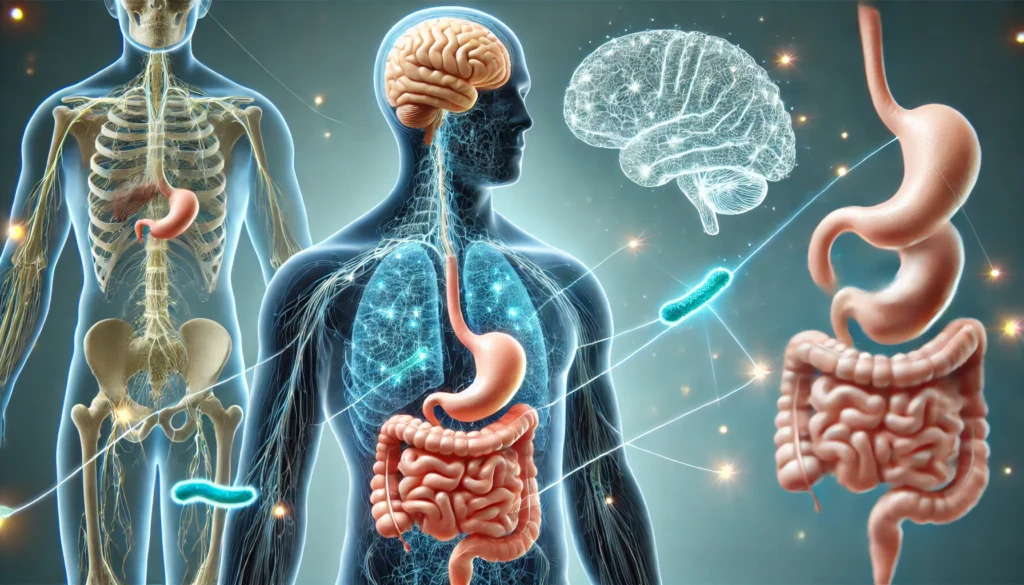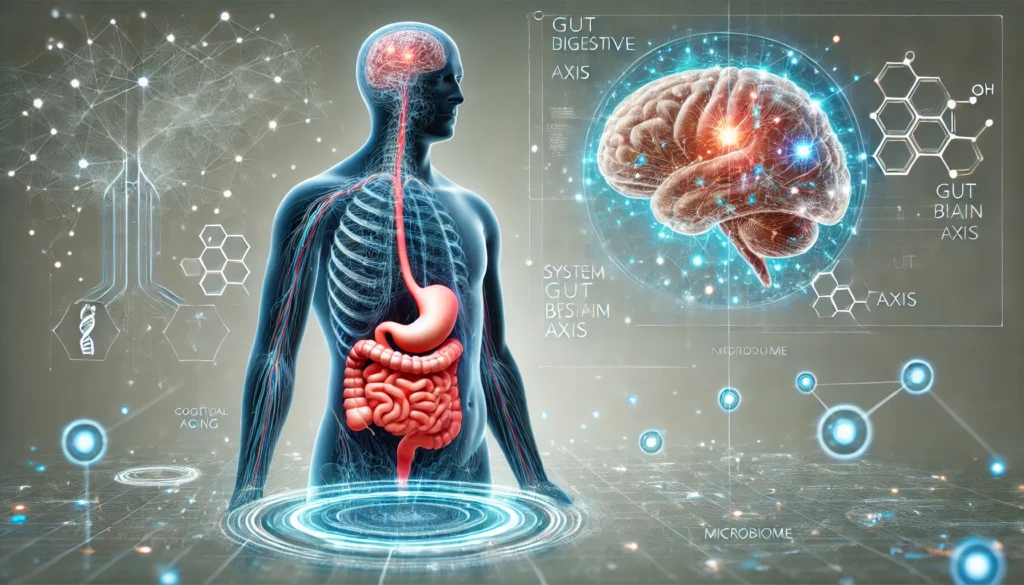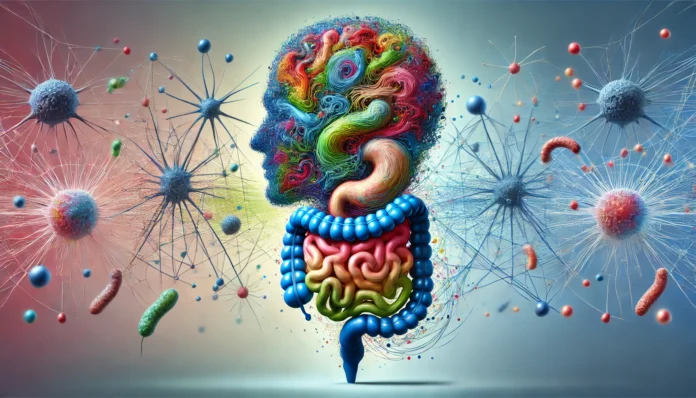In recent years, scientists have begun to unravel the intricate and bidirectional communication system between the gastrointestinal tract and the brain, a relationship now commonly referred to as the gut-brain axis. This complex, dynamic interaction is far more than a metaphorical link—it is a real, biological system grounded in a sophisticated network of neurons, hormones, and microbial messengers. The gut brain connection is emerging as one of the most vital and transformative insights in the fields of neuroscience, psychiatry, and gastroenterology. As research expands, we are beginning to understand how the gut nervous system, often dubbed the “belly brain” or the “gut second brain,” can shape our thoughts, feelings, and even the way we age cognitively. This article explores the mechanisms and implications of this relationship, offering a deep dive into how the gut-brain axis may influence mental clarity, emotional stability, and long-term cognitive health.
You may also like: Best Brain Foods for Focus, Memory, and Longevity: What Science Says
The Biological Foundations of the Gut-Brain Axis
To appreciate the power of the gut brain axis, one must first grasp its physiological underpinnings. The gastrointestinal system is lined with a vast network of neurons, known collectively as the enteric nervous system (ENS), which is often referred to as the stomach brain or gut second brain. This system comprises over 100 million neurons—more than are found in the spinal cord—and it operates with a degree of autonomy that rivals the central nervous system (CNS). The ENS, along with the vagus nerve, serves as a primary communication pathway between the gut and brain, forming the core structure of the gut axis.
Far from being a passive digestive tract, the gut actively senses its environment, processes information, and responds in real time through hormonal, immune, and neural channels. The vagus nerve acts as a superhighway, sending signals from the gut to the brain and vice versa, allowing for constant updates on hunger, satiety, pain, inflammation, and microbial changes. Meanwhile, the central nervous system relies on these updates to regulate digestion, mood, and behavior, demonstrating that the gut brain interaction is continuous and integral to bodily homeostasis. When considering what part of the brain controls digestion, we often refer to the hypothalamus and brainstem, yet the ENS acts almost independently, confirming the functional autonomy of the gut brain.
Microbiota and the Mind: How the Microbiome Influences Brain Function
A central player in the gut-brain connection is the vast community of microorganisms residing in the digestive tract, collectively known as the gut microbiota. This diverse ecosystem plays a crucial role in maintaining the integrity of the intestinal lining, synthesizing vitamins, and regulating immune function. More recently, scientists have uncovered its profound influence on mental and emotional states, coining the term gut brain microbiome to reflect this relationship. The mechanisms behind this influence are multifaceted and involve neuroactive compounds such as short-chain fatty acids (SCFAs), serotonin precursors, and gamma-aminobutyric acid (GABA), all of which can modulate neural activity.
The microbiota gut brain communication system operates through the production of these biochemical messengers, many of which can cross the blood-brain barrier or influence the vagus nerve directly. For example, certain strains of Lactobacillus and Bifidobacterium have been shown to reduce anxiety-like behavior in animal models, a phenomenon that researchers attribute to their role in neurotransmitter synthesis. This gut brain axis and mental health connection is not merely academic; it has clinical implications for conditions ranging from depression and anxiety to neurodevelopmental disorders such as autism. As such, understanding how to optimize this microbiota gut brain interface may be key to enhancing mood and cognitive function.
Mood and Emotion: The Mind Gut Connection in Psychological Health
The mind gut connection has long been observed anecdotally—many people experience gastrointestinal symptoms during periods of stress or emotional upheaval. However, modern neuroscience is now beginning to validate these experiences with empirical evidence. Stress hormones such as cortisol can disrupt gut permeability, alter microbial composition, and impair motility, setting off a cascade of effects that further amplify stress responses in the brain. This feedback loop illustrates how the gut brain axis plays a central role in mood regulation and emotional resilience.
The implications are far-reaching. Disorders such as irritable bowel syndrome (IBS) and functional dyspepsia are increasingly viewed through the lens of brain gut syndrome, where symptoms are driven as much by neural dysregulation as by physical abnormalities. Treatment approaches that integrate dietary changes, psychobiotics, mindfulness practices, and vagal nerve stimulation have shown promise, reinforcing the idea that to heal the gut is to heal the brain. This bidirectional interplay exemplifies the elegance and complexity of gut brain interaction, where the brain influences the gut and the gut shapes the brain in equal measure.

Mental Clarity and Cognitive Performance: The Gut Brain’s Impact on Focus and Memory
Beyond mood, the gut brain connection extends into the realm of cognitive performance. Many individuals are now reporting improvements in mental clarity, focus, and memory following interventions aimed at improving gut health. This is not coincidental. A well-functioning gut axis ensures the smooth production and delivery of critical neurotransmitters such as dopamine and acetylcholine, both of which are essential for concentration and executive functioning. Moreover, gut-derived inflammation is increasingly implicated in cognitive fog and attention deficits.
When the microbiota is disrupted—by poor diet, chronic stress, or antibiotic overuse—the resulting dysbiosis can lead to systemic inflammation that impairs blood-brain barrier integrity and neural communication. The brain axis, in this context, acts as a mediator of inflammatory signals that can either support or sabotage mental clarity. Nutritional psychiatry has emerged as a new discipline dedicated to exploring how food and gut health influence mental performance. Specific diets rich in prebiotics and fermented foods are now recognized for their ability to enhance the gut brain microbiome and, by extension, bolster cognitive capacity.
Cognitive Aging and the Gut Brain Axis: Long-Term Implications for Brain Health
The relationship between the gut brain axis and aging is an area of growing scientific interest. Cognitive decline is not an inevitable consequence of aging, but rather the result of multiple modifiable factors—including gut health. As we age, both the diversity and resilience of the microbiota tend to decline, which may contribute to increased vulnerability to neurodegenerative diseases such as Alzheimer’s and Parkinson’s. This deterioration of the gut brain connection underscores the need to maintain a robust gut nervous system throughout life.
Research indicates that gut-derived metabolites can either promote neurogenesis or trigger neuroinflammation, depending on the balance of microbial species. The concept of brain axes—plural—has gained traction to describe the multifactorial nature of these interactions, incorporating not just the gut-brain axis but also the immune-brain and endocrine-brain pathways. Together, these axes orchestrate the physiological symphony of aging, highlighting that the stomach brain is not an isolated system but part of a broader network influencing longevity.
Strategies to Support a Healthy Gut Brain Connection
For those seeking to optimize the gut brain axis, a number of evidence-based strategies are available. Diet is paramount. A gut brain connection diet emphasizes fiber-rich fruits and vegetables, whole grains, omega-3 fatty acids, and fermented foods, all of which nourish the microbiota and support neurotransmitter production. Avoiding processed foods and artificial sweeteners can help prevent dysbiosis, while incorporating prebiotic and probiotic supplements may offer additional support.
Lifestyle also matters. Regular physical activity has been shown to improve both microbial diversity and brain function, while stress-reduction techniques such as meditation and breathwork can modulate the vagus nerve, strengthening the gut brain interaction. Sleep quality is another key factor, as disruptions in circadian rhythm can destabilize both microbial populations and hormonal balance. By prioritizing these habits, individuals can effectively engage the gut axis to enhance overall well-being.
Emerging Therapies and Future Directions in Gut Brain Research
The field of gut brain research is evolving rapidly, with new therapies and interventions on the horizon. Psychobiotics—probiotics with mental health benefits—represent one of the most promising developments. These specialized strains aim to target the gut brain microbiome with precision, offering potential treatment options for mood disorders, cognitive decline, and even trauma-related conditions. Fecal microbiota transplantation (FMT), though still experimental, is being explored for its potential to reset the microbiota gut brain interface in severe cases.
Researchers are also investigating how personalized nutrition and genomics can be used to tailor gut brain interventions for individual needs. Advances in neuroimaging and metabolomics are shedding light on the real-time effects of gut interventions on brain activity, making the invisible connections between gut and brain more visible than ever before. As this science progresses, the hope is that we can move beyond symptom management to truly heal the gut and, by extension, heal the brain.

Frequently Asked Questions: The Gut-Brain Axis and Cognitive Health
1. How does the gut brain connection influence mental health therapies?
Mental health therapies are increasingly incorporating insights from the gut brain connection to improve outcomes. Traditional approaches like cognitive behavioral therapy (CBT) are being enhanced with nutritional and lifestyle interventions that support the gut brain microbiome. For example, individuals undergoing therapy for anxiety may benefit from incorporating fermented foods, which support gut brain axis and mental health pathways by promoting neurotransmitter balance. The gut second brain’s ability to modulate emotional resilience suggests that addressing gut nervous system health can enhance psychological interventions. Future therapy models may include personalized gut brain connection diets tailored to mental health profiles, creating a more holistic treatment framework.
2. Can the gut brain axis explain why some people are more sensitive to stress than others?
Yes, the gut brain axis may offer insights into individual variability in stress responses. Emerging research suggests that differences in the microbiota gut brain interaction affect how the body and brain perceive and regulate stress. Individuals with a disrupted gut brain microbiome often show heightened cortisol levels and more pronounced mood fluctuations, possibly due to impaired vagus nerve signaling. This sensitivity may also be shaped by early-life exposure to antibiotics, poor diet, or trauma, which disrupt the gut axis during critical developmental windows. Supporting the belly brain through probiotics and stress-reduction techniques may help reduce this sensitivity over time.
3. What is your gut telling your brain during fasting or intermittent fasting periods?
During fasting, the gut communicates nutrient scarcity to the brain via hormonal and neural channels, prompting adaptive responses through the brain axis. One major shift involves the increase in ketone production, which affects neurotransmitter levels and supports neural clarity. Additionally, fasting triggers beneficial shifts in the gut brain microbiome, promoting microbial diversity and reducing inflammation. These changes strengthen the gut brain connection and improve neuroplasticity. Thus, the stomach second brain may actually become more efficient under intermittent fasting, enhancing the mind gut connection for focus and emotional balance.
4. Could poor gut health lead to misdiagnosed neurological conditions?
There is growing concern that poor gut health may mimic or exacerbate symptoms of neurological disorders, leading to misdiagnoses. For instance, dysregulation of the gut nervous system can manifest as cognitive fog, irritability, or sleep disturbances, which are also symptoms of mild cognitive impairment. In some cases, brain gut syndrome symptoms may be mistaken for anxiety or early-stage neurodegeneration. Since few diagnostic protocols currently screen for gut axis dysfunction, there’s a risk of overlooking reversible contributors to mental decline. This underscores the need to evaluate the microbiota gut brain ecosystem when diagnosing neurological symptoms.
5. How do toxins and pollutants affect the gut brain axis and cognitive health?
Environmental toxins such as heavy metals, pesticides, and endocrine disruptors can severely compromise the gut brain axis. These substances damage the intestinal lining, weaken immune responses, and alter the gut brain microbiome, leading to chronic inflammation that can reach the brain. Over time, such disruptions in gut brain interaction may impair memory, attention, and emotional regulation. The gut second brain becomes a key player in detoxification, working alongside the liver and kidneys. Supporting detox pathways through a targeted gut brain connection diet—rich in antioxidants, fiber, and prebiotics—may help counteract these harmful effects.
6. Are there gender differences in how the gut brain connection affects mood and cognition?
Yes, research indicates that sex hormones interact with the gut brain connection in unique ways, leading to gender-specific outcomes in mental health. Estrogen and progesterone influence the gut brain microbiome differently than testosterone, affecting the production of mood-related neurotransmitters. Women, for instance, may experience more fluctuations in gut axis signaling due to menstrual cycles or hormonal shifts during menopause. This could partly explain why certain mood disorders have higher prevalence rates among women. Personalized interventions that consider gender-specific brain axes may be more effective in supporting long-term cognitive wellness.
7. How can travel or changes in routine disrupt the gut brain axis?
Travel—especially across time zones or involving new environments—can destabilize the gut brain axis by disrupting circadian rhythms, diet, and microbial balance. Jet lag, irregular meal patterns, and exposure to unfamiliar foods can challenge the gut nervous system, leading to gastrointestinal issues and cognitive disturbances. This often results in what some call “transient brain fog,” where the stomach brain sends stress signals to the central nervous system. Re-establishing regularity in meals, sleep, and hydration supports both the belly brain and mental clarity. Probiotics or fiber-rich snacks may help rebalance the gut brain microbiome during these transitions.
8. Can improving your gut health impact creativity or problem-solving abilities?
Surprisingly, yes—enhancing the gut brain connection may support not just memory and attention, but also creative thinking. Dopamine and acetylcholine, two neurotransmitters critical to innovation and cognitive flexibility, are heavily influenced by the microbiota gut brain axis. A stable gut brain interaction promotes optimal signaling between the gut and brain, which is essential for accessing higher-order thought processes. Those who prioritize gut brain connection diets often report increased mental agility, clarity, and even more vivid dreams. The stomach second brain’s role in regulating mood and alertness could be a silent ally in unlocking creative potential.
9. How does aging change the dynamics of the gut brain microbiome?
Aging naturally leads to a decline in microbial diversity, which can weaken the gut brain axis and increase vulnerability to cognitive decline. As the gut brain microbiome becomes less robust, the body is more prone to inflammation, reduced neurogenesis, and impaired nutrient absorption. These changes may slow down communication within the mind gut connection, affecting memory and emotional balance. However, certain practices like intermittent fasting, physical activity, and Mediterranean-style eating patterns can rejuvenate the gut second brain. Even in later life, focusing on gut axis health can contribute meaningfully to preserving brain vitality.
10. What emerging technologies are shaping the future of gut brain research?
The future of gut brain research is being transformed by technologies like metabolomics, advanced neuroimaging, and machine learning. These tools allow scientists to visualize the brain axis in real-time and identify how changes in the microbiota gut brain system influence specific neural circuits. Personalized medicine platforms are being developed to design custom gut brain connection diets and supplement regimens based on individual microbiome profiles. Innovations in wearable devices may soon track gut nervous system metrics to optimize daily habits. As these brain axes become better understood, they will likely become central pillars in both preventive care and precision psychiatry.

Conclusion: Reframing Brain Health Through the Gut Brain Connection
The gut brain connection is not merely a biological curiosity—it is a foundational principle of human health that demands a paradigm shift in how we approach mental clarity, emotional well-being, and cognitive aging. From the stomach second brain to the broader brain axes that govern immune and endocrine functions, the gut axis plays a central role in shaping who we are and how we think. Understanding what is your gut, and how it communicates with the brain, opens new doors to preventive and therapeutic strategies that can transform lives.
Whether you are seeking to enhance focus, improve mood, or preserve cognitive function into old age, the answer may lie not in your head, but in your gut. The stomach brain, once considered a metaphor, is now recognized as a tangible driver of brain health. By nourishing the gut brain microbiome and honoring the intricacies of gut brain interaction, we move closer to a future where healing the gut truly does mean healing the brain. In this era of interconnected health, the belly brain is not just a silent partner—it is a powerful, guiding force that helps us navigate the complexities of mind, body, and longevity.
gut microbiome and brain health, vagus nerve stimulation, digestive health and cognition, neuroinflammation and aging, enteric nervous system function, serotonin production in the gut, probiotics for mental clarity, nutrition and brain performance, leaky gut and mental fog, cognitive aging prevention, prebiotics and brain support, brain-gut immune connection, psych biotics for mood, inflammation and depression link, microbiome diversity and brain health, dietary strategies for cognition, mood and digestive wellness, brain-supportive nutrition, stress and digestive system link, neuroplasticity and gut health
Further Reading:
The Gut-Brain Axis: Influence of Microbiota on Mood and Mental Health
The role of microbiota-gut-brain axis in neuropsychiatric and neurological disorders
Exploring the microbiota-gut-brain axis: impact on brain structure and function
Disclaimer
The information contained in this article is provided for general informational purposes only and is not intended to serve as medical, legal, or professional advice. While Health11News strives to present accurate, up-to-date, and reliable content, no warranty or guarantee, expressed or implied, is made regarding the completeness, accuracy, or adequacy of the information provided. Readers are strongly advised to seek the guidance of a qualified healthcare provider or other relevant professionals before acting on any information contained in this article. Health11News, its authors, editors, and contributors expressly disclaim any liability for any damages, losses, or consequences arising directly or indirectly from the use, interpretation, or reliance on any information presented herein. The views and opinions expressed in this article are those of the author(s) and do not necessarily reflect the official policies or positions of Health11News.


